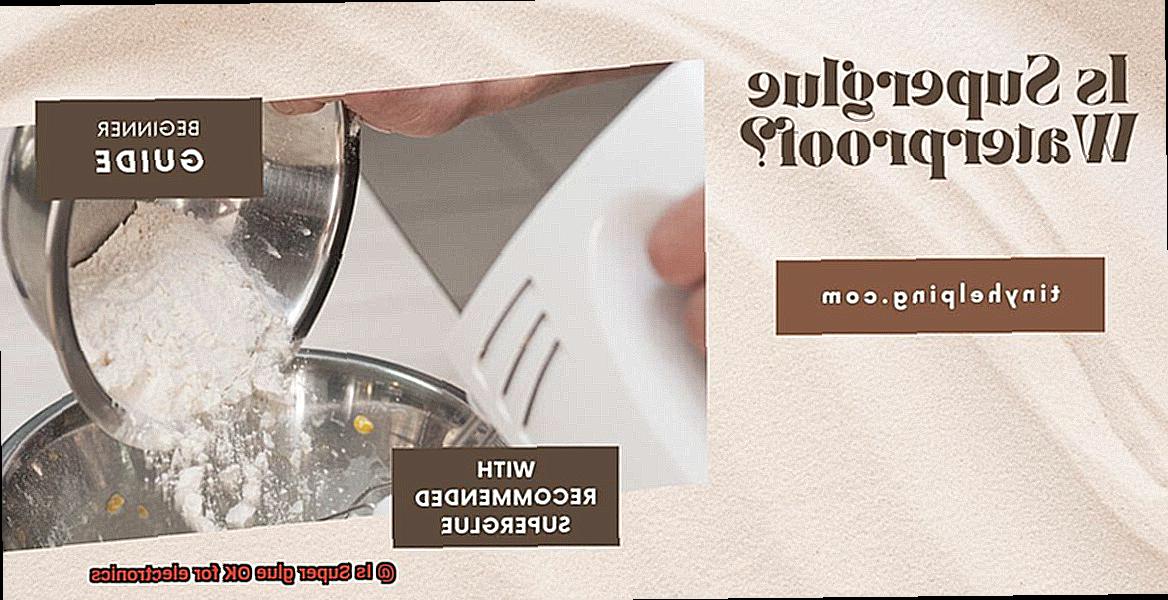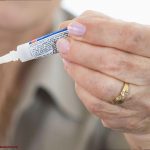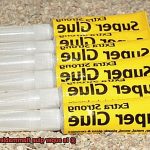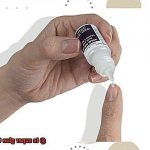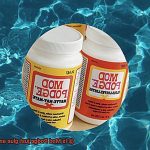Today, we’re diving headfirst into the electrifying world of electronics and the enigmatic bond they share with Super Glue. Imagine this: you’re on the verge of rescuing your precious gadget from certain doom, but you can’t help but wonder – is that little tube of Super Glue your knight in shining armor or a sneaky saboteur? We’ve all been there, my friends. So, let’s embark on this wild ride together as we uncover the truth behind this captivating dance between electronics and the sticky stuff. Get ready to have your mind blown as we separate fact from fiction and unravel the mysteries that lie within.
What is Super Glue?
Contents
- 1 What is Super Glue?
- 2 The Risk of Using Super Glue on Electronics
- 3 Potential Damage Caused by Super Glue on Electronics
- 4 Alternatives to Super Glue for Electronics
- 5 Advantages of Specialized Adhesives for Electronics
- 6 Types of Specialized Adhesives for Electronics
- 7 Application Tips for Specialized Adhesives on Electronics
- 8 Conclusion
When it comes to bonding materials together, one adhesive stands out for its quick-drying and strong bond properties – Super Glue. This powerful adhesive, also known as cyanoacrylate adhesive, has become a staple in many DIY projects and repairs. In this article, we will delve into the properties, uses, and benefits of Super Glue, while also exploring some important considerations when using it on electronics.
Properties of Super Glue:
Super Glue is a clear liquid with a low viscosity that effortlessly flows and spreads over surfaces. Made by combining cyanoacrylate monomers, it forms a strong bond upon exposure to moisture in the air. This chemical reaction creates a versatile adhesive that adheres to a wide range of materials such as plastic, metal, rubber, ceramic, and even skin.
The Benefits of Super Glue:
- Rapid Curing Time: Super Glue sets within seconds and fully cures within minutes, making it perfect for quick fixes and projects that require an instant bond.
- High Strength: Despite its fast-drying nature, Super Glue forms a tight bond that can withstand significant stress and tension. It is ideal for fixing broken objects or bonding small parts securely.
Uses of Super Glue:
Super Glue finds application in various fields, including:
- DIY Repairs: From fixing broken ceramics and household items to mending jewelry or reattaching small parts, Super Glue is the go-to adhesive for quick repairs around the house.
- Crafts and Hobbies: Whether you’re working on model-making, woodworking, or creating intricate crafts, Super Glue’s strong bond ensures that your creations stay intact.
- Medical Applications: In the medical field, Super Glue is commonly used to seal minor cuts and wounds. Its fast-acting nature helps close the skin quickly, reducing the risk of infection.
Considerations for Electronics:
While Super Glue excels in many applications, it may not be suitable for use on electronics. Here are some key points to consider:
- Conductivity: Super Glue contains metal ions that can transfer electricity, potentially causing short circuits and damage to delicate electronic components. Avoid using Super Glue on circuit boards or sensitive electronic devices.
- Degradation: Super Glue is not designed to withstand the heat and humidity that electronics often encounter. Over time, the adhesive may break down, leading to weakened bonds and potential damage to the electronic device.
Alternative Adhesives for Electronics:
To ensure a secure bond without risking damage to electronics, specialized adhesives are recommended. Some suitable options include:
- Epoxy Resin: This adhesive offers excellent bonding strength and is resistant to heat and humidity, making it ideal for electronics.
- Silicone Adhesives: These adhesives provide flexibility and protection against moisture and temperature fluctuations, making them suitable for electronic applications.
- Conductive Adhesives: Specifically designed for electronics, these adhesives offer both bonding capabilities and electrical conductivity.
The Risk of Using Super Glue on Electronics
We have all experienced the miraculous bonding power of super glue when it comes to fixing things in a flash. However, when it comes to electronics, this seemingly innocent adhesive can pose significant risks and potential damages.
In this article, we will explore the dangers of using super glue on our beloved gadgets. So fasten your seatbelts and prepare to dive into the treacherous world of adhesive mayhem.
Conductivity Catastrophe:
The first red flag when it comes to using super glue on electronics is its conductivity. Imagine a tiny electrical current flowing where it shouldn’t be due to a rogue drop of glue. This can lead to short circuits and other electrical malfunctions, leaving your once-shiny new smartphone nothing more than a useless brick. The risks of damaging crucial electronic components are simply too high.
Tricky Extraction:
Super glue has a knack for infiltrating every nook and cranny, transforming repairs into nightmares. Once it finds its way into small crevices or gaps in your electronic components, good luck trying to remove it. Repairing or upgrading your device in the future may become Mission Impossible without causing further damage. The sticky residue left behind by super glue can be a relentless obstacle in the path of proper repairs.
Fumes of Doom:
Ah, the sweet smell of super glue…or is it? When used on electronics, those seemingly innocent fumes can turn into a hazardous threat to both humans and delicate circuitry alike. The corrosive properties of these fumes can slowly eat away at your device, causing long-term damage that may be irreversible. It’s like inviting a toxic cloud to gradually erode the very core of your gadget.
Kiss Your Warranty Goodbye:
Using super glue on your electronic devices comes with a steep price – the voiding of warranties and guarantees provided by manufacturers. They are not joking around when they say unauthorized modifications will nullify any coverage. So, if something goes awry with your device after using super glue, you’re on your own, my friend. Prepare to bear the burden of repair costs without any support from the manufacturer.
Potential Damage Caused by Super Glue on Electronics
In this post, we’ll delve into the dangers of using super glue on electronics. From short circuits to corroded components, we’ll explore the potential damage caused by this seemingly innocent adhesive. So buckle up and join us on this treacherous journey.
Conductivity: A Shocking Discovery
One of the biggest concerns with using super glue on electronics is its ability to conduct electricity. Unlike specialized electronic adhesives, super glue can lead to short circuits or electrical malfunctions. Imagine the horror of a fried circuit board or a malfunctioning device – all because of a tiny drop of super glue.
Corrosive Fumes: A Recipe for Disaster
Super glue contains chemicals that can react with metals and plastics commonly found in electronic components. Over time, these corrosive fumes can degrade or completely destroy your precious devices. So beware. That innocent-looking tube of super glue might turn your electronics into a pile of useless parts.
Physical Barriers: Blocking Connections
In addition to its conductivity and corrosiveness, super glue can create physical barriers between electronic contacts. This prevents proper electrical connections and can result in intermittent or non-functional devices. Your once reliable gadget might become as useful as a paperweight, all because of a hasty application of super glue.
Removal Woes: The Nightmare Continues
Removing dried super glue from electronics is no walk in the park. It often requires scraping or using solvents, which can scratch or dissolve delicate components. Say goodbye to your warranty and hello to frustration as you struggle to remove that stubborn super glue residue.
The Solution: Specialized Electronic Adhesives
To avoid potential damage, it is highly recommended to use specialized electronic adhesives. These adhesives are formulated to be non-conductive and non-corrosive, ensuring the safety and functionality of your electronic components. Don’t gamble with your gadgets – go for the adhesive that’s designed to protect them.
Conclusion: Stick to Safety
In conclusion, super glue and electronics are a recipe for disaster. Its conductivity, corrosiveness, and potential for creating physical barriers can lead to serious damage and malfunctioning of electronic devices. So, bid adieu to super glue and opt for specialized electronic adhesives – your gadgets will thank you.
Alternatives to Super Glue for Electronics
Today, we embark on a journey into the realm of electronics repair, seeking alternatives to the notorious super glue. While super glue may seem like a quick fix, it can wreak havoc on delicate electronic components. Join us as we discover safer and more effective options together.
Epoxy Resin: The Trusty Sidekick
In the world of electronics repair, epoxy resin emerges as the mighty bonding hero. This two-part adhesive forms an unyielding and durable bond, perfect for securing delicate components. With its exceptional insulation properties and resistance to heat and chemicals, epoxy resin ensures your devices remain protected.
Conductive Adhesive: The Electrical Connection Specialist
When soldering is not an option, conductive adhesive swoops in to save the day. This specialized adhesive allows electrical current to flow through it, making it ideal for bonding electronic components. Whether in paste, film, or tape form, conductive adhesive adapts seamlessly to diverse repair needs.
Double-Sided Tape and Adhesive Pads: The Flexible Allies
Flexibility is key in certain repairs, and that’s where double-sided tape and adhesive pads come to the rescue. These alternatives offer a formidable bond while allowing easy removal or repositioning if needed. They prove particularly handy for securing cables or attaching small components without causing any harm.
Mechanical Fasteners: The Sturdy Guardians
For those who value easy disassembly and reassembly, mechanical fasteners like screws and clips are the heroes of choice. They provide stability for larger or heavier components and allow for future repairs or modifications without compromising integrity.
As our expedition into alternatives to super glue for electronics repair draws to a close, remember that each option possesses unique strengths tailored to specific repair requirements.
Whether you choose epoxy resin, conductive adhesive, double-sided tape, adhesive pads, or mechanical fasteners, make an informed decision to ensure the longevity and safety of your precious gadgets.
Advantages of Specialized Adhesives for Electronics
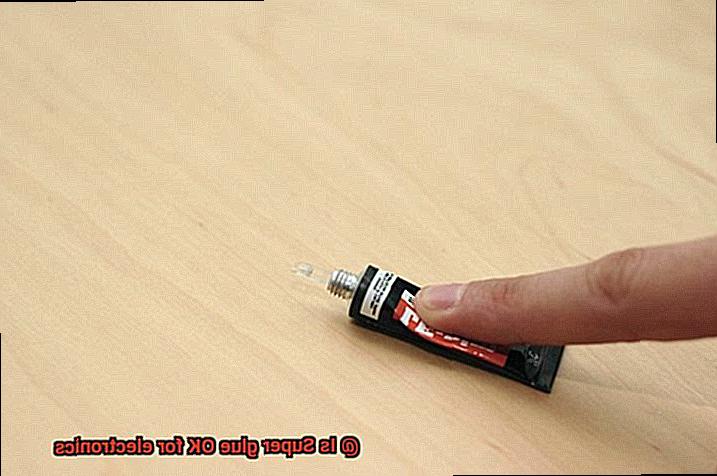
In this blog post, we will explore the numerous advantages of using specialized adhesives for electronics over regular super glue. So, let’s dive in and discover why these specialized adhesives are the true heroes in the world of electronics.
Advantage 1: Electrical Conductivity
Specialized adhesives for electronics possess a remarkable ability to maintain electrical conductivity, setting them apart from regular super glue. Unlike their non-conductive counterparts, these adhesives ensure that electrical signals flow seamlessly through bonded components. This attribute is vital in electronic devices where uninterrupted electricity flow is crucial for proper functioning.
Advantage 2: Thermal Resistance
Electronic devices generate heat during operation, which can potentially damage adhesive bonds. However, specialized adhesives for electronics are engineered to withstand high temperatures, remaining stable and maintaining their bonding strength even in demanding thermal environments.
This exceptional thermal resistance prevents adhesive melting or degradation, effectively prolonging the lifespan and reliability of electronic devices.
Advantage 3: Chemical Compatibility
Electronics often come into contact with various chemicals, such as cleaning agents, solvents, or fuels, depending on their application. Regular super glue may not withstand exposure to these chemicals and can deteriorate over time. In contrast, specialized adhesives for electronics are designed to be chemically compatible with common electronic device materials.
They exhibit excellent resistance to chemical degradation and provide a reliable bond even in harsh chemical environments.
Advantage 4: Mechanical Strength
To ensure the longevity and durability of electronic assemblies, it is crucial to utilize adhesives with exceptional mechanical strength. Specialized adhesives for electronics are specifically formulated to provide robust bonding capable of withstanding various mechanical stresses, including vibrations, shocks, and impacts. They offer high tensile strength, shear strength, and impact resistance, effectively preventing component detachment or failure due to mechanical forces.
Advantage 5: Moisture and Environmental Protection
Electronic devices often face exposure to moisture and other environmental factors like humidity or dust particles. If the adhesive used in electronic assemblies is not moisture resistant, it can result in corrosion, electrical shorts, or even complete device failure. Specialized adhesives for electronics are designed to provide a formidable barrier against moisture and environmental contaminants. These adhesives offer excellent moisture resistance, ensuring that water or other substances cannot compromise the integrity and functionality of electronic components.
Types of Specialized Adhesives for Electronics
In the world of electronics, where precision and reliability are paramount, using the right adhesive is crucial. Super glue may work for general purposes, but when it comes to electronics, specialized adhesives are a must. These adhesives are specifically designed to meet the unique demands of electronic applications, providing strong bonds, electrical conductivity, thermal management, and insulation. In this article, we will explore the different types of specialized adhesives used in electronics and their applications.
Conductive Adhesives:
Conductive adhesives are formulated to not only provide a strong bond but also maintain electrical connectivity between components. They contain conductive particles such as silver or graphite, allowing them to create a conductive path. These adhesives are commonly used in bonding wire connections, grounding straps, and circuit board traces. They ensure reliable electrical connections while eliminating the need for soldering or welding.
Thermally Conductive Adhesives:
Thermally conductive adhesives are designed to dissipate heat effectively from electronic components. They have a high thermal conductivity, allowing them to transfer heat away from sensitive parts like semiconductors or power devices. This helps prevent overheating and ensures optimal performance and reliability of electronic devices. Thermally conductive adhesives are commonly used in applications such as bonding heat sinks, attaching power transistors, or LED modules to heat sinks.
Insulating Adhesives:
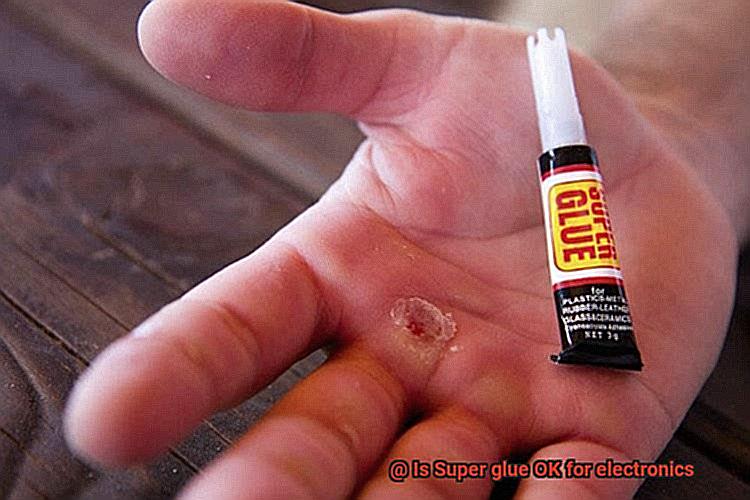
Insulating adhesives are used to create barriers between conductive materials or components to prevent electrical short circuits or interference. These adhesives have high dielectric strength and low electrical conductivity, making them ideal for applications where electrical insulation is crucial. Insulating adhesives are commonly used in potting or encapsulating sensitive electronic components, bonding insulators on circuit boards, or coating wire connections to prevent accidental contact.
UV Curable Adhesives:
UV curable adhesives offer fast curing times and excellent bond strength. These adhesives are cured using ultraviolet (UV) light, which triggers a chemical reaction that turns the liquid adhesive into a solid. This quick curing process allows for faster production times and increased efficiency in electronic manufacturing. UV curable adhesives are commonly used in bonding glass to LCD displays, securing optical fibers, or encapsulating sensitive components.
Epoxy Adhesives:
Epoxy adhesives are known for their high strength, durability, and chemical resistance. They provide excellent bonding properties and are commonly used in electronic applications where a strong and reliable bond is required. Epoxy adhesives can be formulated with various properties, such as high temperature resistance, low outgassing, or low shrinkage. They are often used in bonding components on circuit boards, encapsulating electronic modules, or potting connectors.
Application Tips for Specialized Adhesives on Electronics
Selecting and using the right specialized adhesive is crucial for ensuring strong and safe bonds in electronics. These adhesives offer unique properties that are specifically designed for electronic components, guaranteeing a secure and reliable bond. In this blog post, we will explore the importance of choosing the right adhesive and provide application tips to ensure successful bonding on electronics.
Compatibility with Different Substrates:
The first step in selecting the right adhesive is considering its compatibility with different substrates commonly found in electronic devices, such as plastics, metals, and glass. Adhesives that can adhere well to these sensitive materials without causing any damage are essential for a reliable bond.
Surface Preparation:
Before applying the adhesive, proper surface preparation is vital. Thoroughly cleaning the surfaces to remove contaminants like dust, grease, or oils ensures optimal bonding performance. It is important to follow the recommended cleaning agents or solvents provided by the adhesive manufacturer to achieve the best results.
Following Manufacturer Instructions:
To achieve optimal bonding performance and long-term reliability, it is crucial to carefully follow the instructions provided by the adhesive manufacturer. These instructions include application techniques, curing times, and temperature requirements. Adhering to these guidelines ensures that the adhesive performs at its best and provides a strong bond.
Applying the Right Amount:
Using the appropriate amount of adhesive is vital for a strong bond. Too little adhesive may result in weak bond strength, while excessive adhesive can lead to overflow or damage to sensitive components. Following the recommended application thickness ensures the desired results without compromising the integrity of the electronics.
Proper Curing:
Some specialized adhesives require specific curing conditions such as heat or UV light. Providing the necessary conditions for proper curing is crucial for achieving maximum bond strength. Skipping this step can significantly impact the overall effectiveness of the adhesive and compromise the durability of the electronics.
Also Read: Can You Super Glue Electrical Wires?
Conclusion
Super glue should never be used on electronics.
It may seem tempting to reach for this adhesive when trying to fix a broken device, but it can cause more harm than good. Electronics are delicate and require specialized adhesives that won’t damage their components or interfere with their functionality.
Super glue is too strong and can create a permanent bond that makes repairs nearly impossible. Furthermore, its chemical composition can corrode sensitive electronic parts, leading to irreversible damage.
Instead, opt for adhesives specifically designed for electronics, such as conductive epoxy or silicone-based adhesives. These options provide the necessary strength and flexibility without posing a risk to your devices.
So remember, when it comes to fixing electronics, leave the super glue on the shelf and choose the right adhesive for the job.

